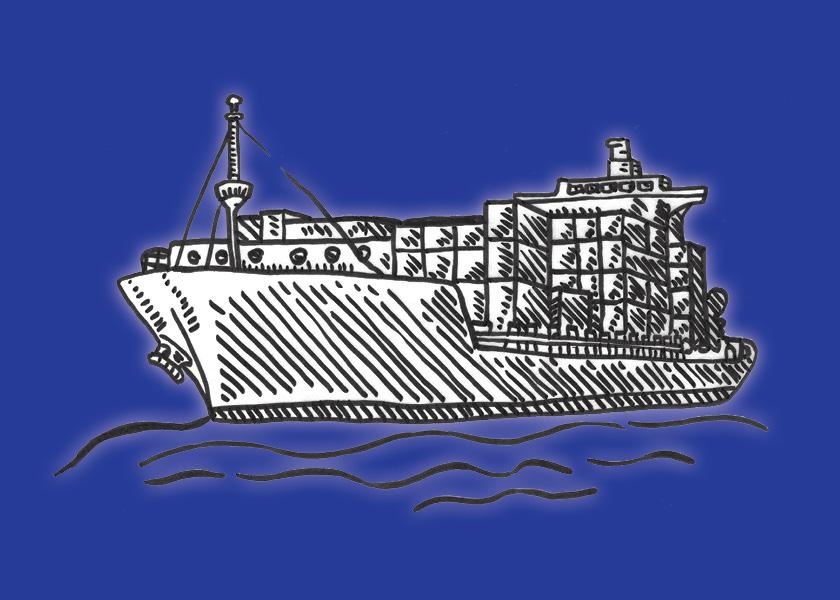U.S. Ag Exports Missing The Boat Due To Out Of Whack World Supply Chain

If international trade were an Olympic sport, then the U.S. would have lost this latest round of competition by more than a mile. Actually, we lost this one by more than a trillion—a trillion dollars, that is—as the U.S. trade gap in goods grew to $1.08 trillion in 2021.
This was the first time in history the trade deficit surpassed $1 trillion.
Economists would quickly point to the fact that trillions of dollars of government stimulus primarily fueled such a buying frenzy among domestic consumers. But that’s only part of the story, and agriculture is caught up in this very complicated storyline.
Agriculture is turning out to be the unintended victim—as the fallout from the pandemic adds another plot twist to the reality in which we now live. Peel back the onion. Dig a little deeper. You will find consumers burning government-borrowed money on stuff “Made In China” is just one reason such a bloated trade gap exists.
A second reason is this—ships bringing all this “stuff” from China and other Pacific Rim countries are hastily dropping off their goods at the port and hightailing it back across the sea with their hulls empty.
That means the “Grown in the USA” agricultural product didn’t leave the dock for another day or week or until it was rendered worthless in some cases or the buyer found another supplier.
Billions of dollars of U.S. agricultural goods never left port last year, and the problem doesn’t seem to be getting any better this year. An informal survey by the Agriculture Transportation Coalition, which represents exporters, found about 22% of agricultural exports were being lost due to transportation issues.
The National Milk Producers Federation estimates shipping disruptions cost dairy exporters $1 billion in the first half of 2021. According to the group, 72% of containers at one point leaving major California ports were empty. That’s a record.
Leprino Foods, a global dairy ingredients supplier based in Denver, Colorado, reported it is holding its cheese in refrigerated containers, which chalked up an extra $25 million in fees last year. Mike Durkin, Leprino’s CEO, in testimony to the U.S. House Agriculture Committee last November warned that the repercussions of failing to deliver exports of U.S. farm goods to customers could have dire long-term consequences.
“The export crisis may well result in irreparable harm to American agriculture as customers around the world are questioning the U.S. dairy industry’s reliability as a supplier,” Durkin said.
The reason this is happening is rooted in simple economics. Shipping rates for goods to the U.S. have been running seven times higher than the cost of moving domestic goods abroad.
How did we get into this mess, and more importantly, how do we get ourselves out? Blaming COVID-19 by itself is way too simple, and at this point, that is the most worn out cliche on the planet. The reality is that we’ve experienced a perfect storm of unfortunate events, lack of resources, bad governmental policies and greed. This is a supply chain train wreck continuing to derail a true economic recovery, especially in agriculture.
At the epicenter of this supply chain tragedy is the Shipping Port of Southern California—known as the Port of Los Angeles. In early January, more than 109 vessels were backlogged at sea and waiting to unload at the port. Most will have left port empty.
Maybe, just maybe some light could be on the horizon. But it literally is going to take an act of Congress to make it reality. Recently, a bill to address ocean carriers cancelling shipping contracts was introduced in the House of Representatives by Rep. Dusty Johnson, R-S.D. He is the chief sponsor of the Ocean Shipping Reform Act that passed the chamber in November by a vote of 364-60.
Government certainly doesn’t hold all the answers, but it definitely should put up a fight when it comes to international trade and work to ensure that the game is played fairly.
Meanwhile, agriculture’s domestic recovery hangs in the balance. So many issues must be addressed when it comes to this whole supply chain drama. This is a game we cannot afford to lose, and we will lose if something doesn’t change soon.







